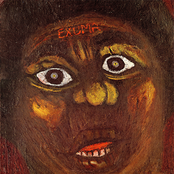Exuma I

Biography
Exuma was Bahamian musician, artist, playwright and author Macfarlane Gregory Anthony Mackey (born 18 February 1942 on Cat Island, Bahamas; died 25 January 1997; Nassau, Bahamas). Known for his almost unclassifiable music, he recorded many albums, starting with Exuma, The Obeah Man in 1970 and ending with Rude Boy in 1986. His songs invoke influences from calypso, junkanoo, reggae, African and folk music with his lyrics dealing heavily with Obeah, a sorcerous Caribbean folk religion resembling A...
Exuma was Bahamian musician, artist, playwright and author Macfarlane Gregory Anthony Mackey (born 18 February 1942 on Cat Island, Bahamas; died 25 January 1997; Nassau, Bahamas). Known for his almost unclassifiable music, he recorded many albums, starting with Exuma, The Obeah Man in 1970 and ending with Rude Boy in 1986. His songs invoke influences from calypso, junkanoo, reggae, African and folk music with his lyrics dealing heavily with Obeah, a sorcerous Caribbean folk religion resembling African voudou. He toured with a backing band of six people, known as The Junk Band.
McKay moved to New York City at the age of 17 to study architecture. In 1969 McKay launched the group "Exuma" with his then-partner and lifelong friend Sally O'Brien. He enlisted several musician friends, forming his backup band, the Junk Band. The band included O'Brien (as Princess Sally), Bogie, Lord Wellington, Villy, Spy Boy Thielheim, Mildred Vaney, Frankie Gearing, Diana Claudia Bunea (as Princess Diana), and his good friend Peppy Castro (Emil Thielhelm, lead singer of the Blues Magoos).
By the 1980s McKay had moved to New Orleans and was a regular at the New Orleans Jazz & Heritage Festival.
Over the years the group Exuma played and / or toured with Patti LaBelle, Curtis Mayfield, Rita Marley, Peter Tosh, Toots & the Maytals, Sly and the Family Stone, Steppenwolf, Black Flag and the Neville Brothers. Numerous artists performed on his recordings and in his stage shows.
After growing up on Cat Island, Tony McKay moved to New York City at the age of 17 to study architecture. However, he did not complete his studies and soon entered the music industry in a group called Tony McKay and the Islanders. In New York's 1960s Greenwich Village folk scene McKay often found himself performing with such greats as Bob Dylan, Richie Havens, Jimi Hendrix, and Barbra Streisand among others.
He soon gained the attention of Blues Magoos manager Bob Wyld. Wyld brought McKay to Mercury Records and convinced them to sign him. In 1970 McKay, now redubbed Exuma, released the albums Exuma and Exuma II. From those albums he released the singles "Exuma, The Obeah Man", "Junkanoo", "Damn Fool", and "Zandoo". Exuma also garnered recognition for his song "You Don't Know What's Going On", which was featured on the soundtrack to John G. Avilsen's 1970 film Joe starring Peter Boyle, Susan Sarandon, and Dennis Patrick.
Exuma left Mercury in 1971 to sign with the Kama Sutra label, where he released the albums Do Wah Nanny (1971), Snake (1972), Reincarnation (1972), and Life (1973). From these albums he released the singles "Do Wah Nanny", "The Bowery", "Brown Girl", "Rushing Through the Crowd", and a cover of Paul McCartney's "Monkberry Moon Delight". After low sales and seeking the freedom of independence, Exuma was no longer featured on a major record label for the rest of his career. He released Penny Sausage, Going to Cat Island, Universal Exuma and Street Life in the early 1980s, but none of these albums received much exposure.By this time, Exuma was enjoying his greatest recognition. In the Bahamas, he even scored two hit singles, "Shirlene" and "Rose Mary Smith." He had moved to New Orleans and was a regular at the New Orleans Jazz and Heritage festival. He performed regularly at the Old Absinthe Bar. These nights could become jam sessions, as he had a habit of starting songs that were not in the set list and he still attracted great musicians, such as Bill Wyman and Bob Dylan's backing band. In 1986 under the ROIR label, Exuma released Rude Boy, which garnered slightly more attention and featured songs from some of his previous 1980s releases.
Over the years Exuma has played and/or toured with Patti LaBelle, Curtis Mayfield, Rita Marley, Peter Tosh, Toots & the Maytals, Sly and the Family Stone, Steppenwolf, Black Flag and the Neville Brothers. Exuma was even recognised by Queen Elizabeth II in 1978 when she awarded him the British Empire Medal for his contributions to Bahamian culture.
In the late 1980s, Exuma suffered a mild heart attack, and thus devoted much more of his time to painting, his other great talent. His paintings have been exhibited several times and collected by many art lovers. Never abandoning his music however, he still wrote and performed his original music. He continued to perform at the New Orleans Jazz Festival until 1991. The last years of his life saw him splitting his time between Miami, Florida and Nassau, in a house that his mother had left him. He died in his sleep in 1997.
Professor and fellow Bahamian Alfred M. Sears stated that Exuma was "A Bahamian visionary, humanistic philosopher and people's poet. Exuma gives expression to the beauty and power of the cultural life of the Bahamas - the people's every day experiences, folklore, myths, stories, junkanoo, rake and scrape, pain, joy, struggle and survival. His life and art reflect the wonderful cultural heritage and personality of Bahamians, drawing on the roots of Africa and the branches of the Amerindians, Europeans and Americans."[2]
Tony McKay had many children including Gavin, Kenyatta, Acklins and Jahleena. His first son, Shaw and his mother, "Sammy" were murdered in the early 1970s in New York's Lower East Side. Both Acklins and Kenyatta Alisha are vocal artists, carrying on the tradition of their father through their individual genres. Read more on Last.fm. User-contributed text is available under the Creative Commons By-SA License; additional terms may apply.
